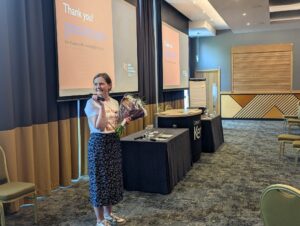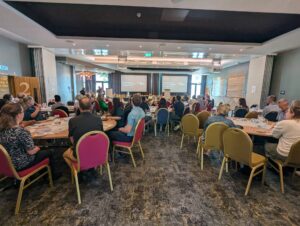12 June 2025

By Lilly Trapp – Research Facilitator, Kent County Council
What an honour it has been to be the Kent County Council (KCC)-based half of the ‘Researcher in Residence’ model during the Kent Research Partnership!
When I started this role, I was excited about the possibility of research, but I had only a surface-level understanding of the adult social care research ecosystem. During the Partnership I have worked between the local authority and the University of Kent to build bridges between these two institutions, while also gaining experience, knowledge and skills about research methods, co-production, ethics and governance, local and national research infrastructure and much more.
As I look back on what we have achieved during this Partnership, I share some reflections about my experience and how I hope this role and other efforts for building research capacity will develop in the future.

-
Partnerships are about the ‘small’ things as much as the formal processes
One of the most valuable aspects of the Researcher in Residence model was its two-way nature. Having go-to colleagues, being part of a team alongside them, using their contacts and networks to boost links with academia and opening doors for them with individuals and teams at the council, spending time together in the office but also at events, conferences and social occasions. I was particularly well-embedded into the university not because of formal processes, but because the team were so open and enthusiastic about welcoming me in. I have my own desk in the University so people can find me, I am a member of the unit’s WhatsApp group, Teams chats and various other informal communication channels, all of which makes it much easier to know what’s going on, who is interested in what topics, get advice, seek collaborators and more. This foundation made it much easier to work together, share, learn and support each other throughout the Partnership.
2. Flexibility vs clarity
As a new role, I had considerable scope to shape what it would look like, and we needed to work out what activities would be useful. In my first meeting with my fellow Researcher in Residence colleagues, I remember one of them wisely saying “you have to be OK with uncertainty” – and how right she was! At times, the novelty, flexibility, autonomy and scope of the role made me wonder what exactly I was supposed to be doing, where to focus my energies, and how I would measure my impact. I developed workplans with my line manager, but these were always subject to change given how much flexibility is required in the role, for example, being asked to join a research bid which then becomes a significant piece of work, while also trying to maintain other activities.
We also made some changes to our plans in response to feedback from colleagues. For example, in the beginning we invested time in trying to open up access to academic resources for people working in local authorities – something we thought would be essential. But in practice, the demand wasn’t high. Instead, colleagues from senior leadership, policy and innovation teams started coming to me asking for rapid evidence reviews to support their work so this has become a significant aspect of my role.
As the Partnership comes to an end and I have been updating my job description for the next phase of the role, it is clear that we have found more success by building research awareness into existing projects and learning activities rather than trying to start our own. In the next phase, we will try to develop a sustainable approach by applying for research funding for priority projects which will also involve a wider group of colleagues in a more tangible way, rather than by trying to “teach” research which can feel quite abstract and reinforce the idea that research is separate from practice rather than a key component of innovation and practice development.
3. Patience, persistence, and purpose
Culture change takes time. In a large organisation, it is easy to lose sight of what’s happening. But champions (such as members of our fantastic Lived Experience Working Group) help to stay focused on the main goal of developing research awareness and culture change. Small moments help to demonstrate the progress we have made even if our impact is difficult to capture formally. A few examples of things that stand out to me include:
- The research partnership and commitment being mentioned as a strength in the local authority’s CQC report
- Winning the runner-up award as best team at KCC
- Members of the Lived Experience Working Group joining new projects and developing their careers and leadership in research and co-production
- Seeing practitioners we have supported winning research-related awards as well as securing new roles in practice
- Being approached more regularly to join bids for research funding and feeling confident to work on bids as an equal partner
- Submitting an application devised and co-led by KCC and people who draw on care and support
- Observing teams considering data collection, evaluation and research methods when designing projects or questioning how things are done
All of these moments, whether formal recognition, small wins, or more tangible impacts, demonstrate the wide-ranging benefits of engaging in research and the importance of roles like mine in supporting others to make this happen.
4. Local authorities could learn much more from each other
My role has developed during the Partnership, as has the wider landscape of building a culture of research in local authorities. I am now proud to part of a pioneering and rapidly growing group of people with research-related roles in adult social care teams and organisations including Embedded Researchers, Researchers in Residence, Local Authority-based Fellows, Local Authority Research Practitioners, Knowledge Mobilisation Fellows, Community Researchers and more. There are burgeoning networks of colleagues who are practitioner-researchers as well as for those of us in research governance and support roles, and many of us in these roles have the privilege to attend conferences and other events which our other colleagues don’t have the time, awareness or permission to attend.
This has made me realise how much is going on across the sector that is not captured, shared or learnt from – from new approaches to building research capacity, to projects and evaluations assessing shared priorities. Through our Communities of Practice, we have tried to address this, for example by having speakers from other local authorities, but one of my key aims for the next stage of the role is to build on work we have started to improve connections between local authorities to improve sharing of good practice and evidence even if it is not peer reviewed, gold-standard research.

5. Building sustainable career pathways
As research in local authorities and adult social care develops, it is vital to remember the importance of research infrastructure roles and to be build up systems which can sustain these efforts, just as R&D offices have developed in the NHS and many other industries. For example, it would be great to see dedicated funding for a Local Authority Research Practitioner role in Adult Social Care, just as there is in Public Health, and to strengthen pathways for career development in a system that is often reliant on fixed-term funding.
We have started to cost my role in to research funding bids in recognition of the value of having a dedicated resource at the local authority to support research, and to demonstrate our commitment to the funder, and this is a great step. However, given there are other aspects to the role beyond being part of funded research projects (such as maintaining the internal research group, considering external research governance requests, supporting staff, literature reviews etc), it is unlikely that the academic funding model will cover the full role. These roles therefore ought to be considered as part of the wider infrastructure for research in the region, with development pathways and opportunities to develop expertise and leadership.
While my role was designed to boost research capacity in the organisation, I have also developed my own research skills, confidence and capacity considerably as part of this initiative. I have now taken on my own Research Fellowship with the Applied Research Collaboration Kent Surrey Sussex (ARC KSS) which combines my adult social care research knowledge with my voluntary sector experience to explore the experiences of people working in social care roles while seeking asylum. This is an opportunity I wouldn’t have considered a few years ago which, in itself, demonstrates the impact of building research capacity in Kent. Working more closely with the ARC as also opened up more connections and collaborations which will be instrumental as the Kent Research Partnership ends, and this Research Facilitator model gets adopted into our regional research infrastructure.
Overall, being part of the Kent Research Partnership has been an amazing opportunity for me personally – I have developed skills and my own career in new directions, supported colleagues to generate their own research and develop as experts by experience, and started to influence how research awareness can be applied throughout the local authority whether in formal research or day-to-day projects and practice. As we reach the end of the Partnership, I have so many more hopes, ideas and aspirations for developing a culture of research so I am extremely grateful that KCC and the Applied Research Collaboration will continue to support this role and sustain the impact – it feels like we are only just getting started!